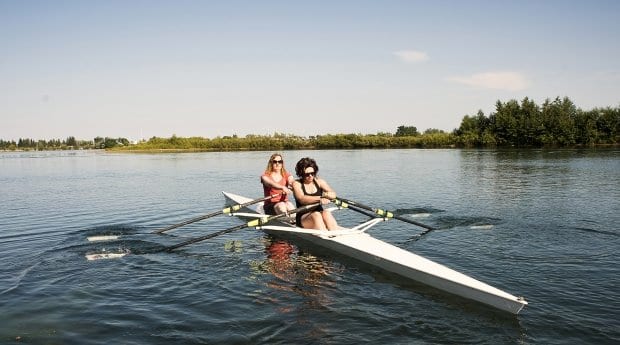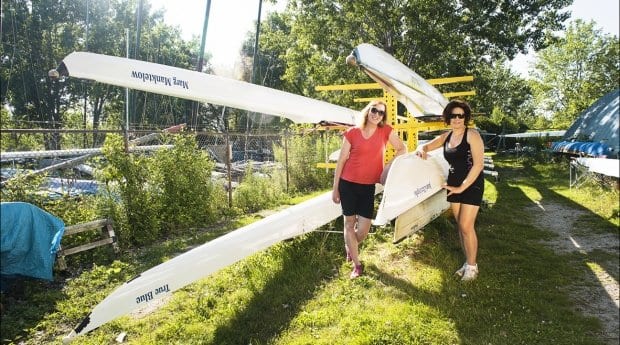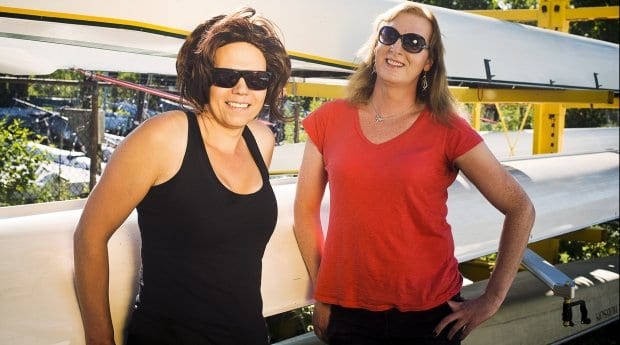
Credit: N. Maxwell Lander

Credit: N. Maxwell Lander
At 8am every Sunday morning, you’ll find Enza Anderson and Savannah Burton in an unexpected place — rowing a boat along the Toronto shoreline.
The pair picked up the oars for the first time just a few months ago, but on Aug 24, Anderson and Burton will make Canadian sports history as the first trans people to participate in a rowing marathon. They will row 22 kilometres for almost two hours along the Ottawa River in a team with three other people called Team Trans-fusion.
Both Anderson and Burton faced a unique set of challenges getting into Sunday’s race.
“I’ve never done any sports, right?” Anderson says over lunch one afternoon on a Church Street patio with Burton; Adrian Cornelissen, the team captain; and Bryn Hendricks, the team’s media and public relations manager.
As a former mayoral candidate and prominent activist in the LGBT community, she’s built her reputation around her supermodel persona. Today, like all other days, she is perfectly coiffed and made up.
Anderson has come to lunch from the Bank of Montreal branch on Church Street, where she works full-time. It was there that Cornelissen first approached her and asked if she was interested in joining Hanlan Boat Club, a rowing club located on the waterfront near Cherry Beach in Toronto’s east end.
Rowing is among the most physically intense sports, even for casual rowers. Athletes need excellent endurance, timing and physical strength — all while working with a team. “It’s almost more intimate than having sex,” Cornelissen says. “You have to rely on each other; you have to be in sync with each other; you have to be rowing as one.”
For the fashion-conscious Anderson, eschewing her clothes and makeup for sweaty rowing gear proved challenging. “For me, my makeup is like my identity,” she says.
But at 50, Anderson was looking for a new hobby and a new way to take care of herself physically. Going to traditional gyms often presents problems for trans people, Anderson notes, so she was looking for an alternative.
Burton is no stranger to sports. From an early age, she played both baseball and hockey. Later in life she became involved in competitive dodge ball, representing Canada at the 2012 World Dodgeball Championships in Kuala Lumpur.
However, she took a step back from sports about a year and a half ago as she began her transition process. “I needed a break from everything while I focused on myself and dealt with life,” she says.
Rowing is the first sport she has tried since making her transition. “It was a scary process,” she says. “I was really nervous about joining this rowing program.”
But at Hanlan, she and Anderson found the accepting environment they were looking for. “To physically be in a boat with other members and just be totally accepted — it’s a wonderful feeling,” Anderson says. Both started in the Learn to Row program and now compete recreationally.
For the competitive Burton, the experience of returning to playing sports has been so positive that she’s now thinking about rejoining her old dodge ball team. “It was a new beginning for me, and it has made playing sports easier for me now,” she says.
Cornelissen encouraged both Anderson and Burton to join the team in the hopes of building a more diverse club. Eventually, they would like to have a trans-inclusive summer camp for youth at Hanlan, where Burton and Anderson could serve as mentors.
Rowing is a leveller of physical ability — as long as you can find a team or a partner who matches your own abilities, anyone can do it. While some races are divided into female and male teams, others are mixed. On Aug 24, Anderson, Burton and Cornelissen will row in a mixed team of five.
Cornelissen thinks it may be the perfect sport for burgeoning trans athletes who feel uncomfortable participating in other sports for fear of judgment. “It’s a battle when we walk outside of the house sometimes,” Burton says, a feeling that is magnified in a sporting environment, where a player’s every move is dissected.
Row Canada’s own policies regarding trans athletes are vague. While there is no specific language about inclusion of trans athletes, its policy says that there should be equitable allocation of resources and opportunities for participation “without discrimination on the basis of gender.” Michael Walker, the president of Row Canada, was unavailable to comment on this story, but he will be speaking about the significance of the event on Sunday after the race.
International competition could also present a problem for trans people. The International Olympic Committee has already been criticized for its stance on trans people competing in the Olympics: athletes must have already undergone sex-reassignment surgery, have had hormone treatments for two years and have been legally recognized as their sex before competing. Competitors can also be asked to take hormone tests to prove their gender.
However, Burton — who hopes to compete at more advanced levels — doesn’t believe she will have any problem competing in Row Canada events.
For now, the pair is focusing on the 22 kilometres they have to row down the Ottawa River Sunday morning. They’ll be getting ready with a spaghetti dinner the night before and then be up with the sun to get down to the water.
For Burton, being out on the water is relaxing and fun — a feeling she thinks will carry over to the race. “It’s a real camaraderie that you feel,” she says. “I’m sure it will be even better when we get to the competition.”
Team Trans-fusion competes Sunday, Aug 24, at 8am at the Ottawa New Edinburgh Club. A special ceremony honouring the occasion will follow at 11am and will feature speakers Michael Walker, MPPs Madeleine Meilleur and Yasir Naqvi, LGBT sports activist Jennifer Birch-Jones and Helen Kennedy, the director of Egale Canada and the grand marshal of the Ottawa Pride parade.


 Why you can trust Xtra
Why you can trust Xtra


